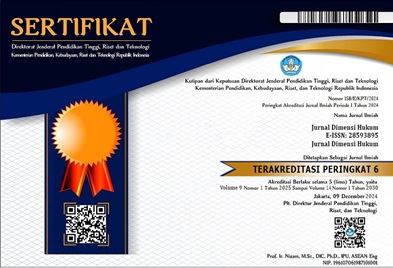TRANSFORMASI REGULASI PERSAINGAN USAHA DI ERA EKONOMI DIGITAL DI INDONESIA
Kata Kunci:
Hukum, Persaingan, Usaha, Inovasi, Ekonomi, Digital, RegulasiAbstrak
Inovasi menjadi elemen kunci dalam meningkatkan daya saing dan pertumbuhan ekonomi suatu negara, terutama di era globalisasi dan digitalisasi. Hukum persaingan usaha berperan penting dalam menciptakan ekosistem pasar yang kompetitif, adil, dan mendukung inovasi. Artikel ini membahas hubungan antara hukum persaingan usaha dan inovasi di Indonesia, dengan fokus pada evaluasi efektivitas Undang-Undang No. 5 Tahun 1999 dalam mencegah praktik antikompetitif serta mendukung kreativitas pelaku usaha. Selain itu, dibahas pula tantangan yang dihadapi, seperti kesenjangan regulasi dengan perkembangan teknologi, dominasi platform digital, dan rendahnya tingkat kepatuhan pelaku usaha. Melalui analisis ini, direkomendasikan langkah strategis untuk memperkuat peran hukum persaingan usaha, termasuk harmonisasi regulasi, penguatan kapasitas lembaga pengawas seperti KPPU, serta edukasi bagi pelaku usaha. Dengan pendekatan yang terintegrasi, hukum persaingan usaha diharapkan dapat mendorong transformasi ekonomi berbasis inovasi yang berkelanjutan dan inklusif di Indonesia.
Innovation is a key element in increasing a country's competitiveness and economic growth, especially in the era of globalization and digitalization. Business competition law plays an important role in creating a market ecosystem that is competitive, fair and supports innovation. This article discusses the relationship between business competition law and innovation in Indonesia, with a focus on evaluating the effectiveness of Law no. 5 of 1999 in preventing anti-competitive practices and supporting the creativity of business actors. Apart from that, the challenges faced were also discussed, such as the gap between regulations and technological developments, the dominance of digital platforms, and the low level of compliance of business actors. Through this analysis, strategic steps are recommended to strengthen the role of business competition law, including harmonization of regulations, strengthening the capacity of supervisory institutions such as the KPPU, as well as education for business actors. With an integrated approach, business competition law is expected to encourage sustainable and inclusive innovation-based economic transformation in Indonesia.





